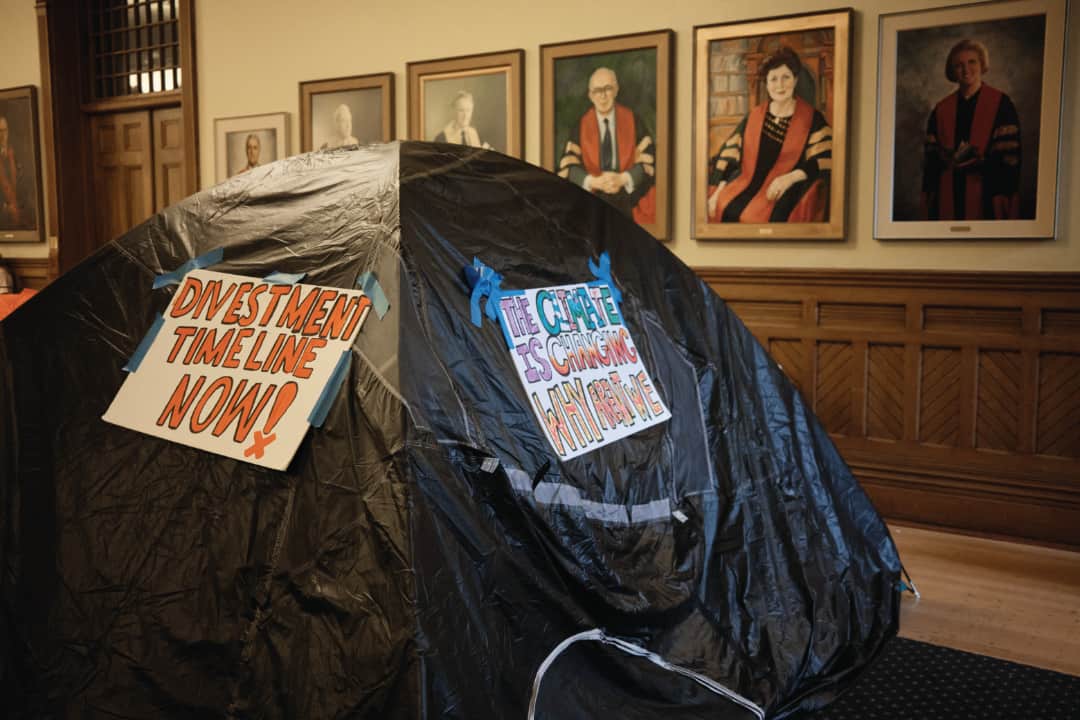On March 27, Climate Justice UofT, a group of student environmental activists, began an occupation of Victoria College’s “Old Vic” Building. As of April 1, approximately 200 students had participated in the occupation, with students remaining in the building around the clock. In anticipation of the April 13 Victoria University Board of Regents (BOR) meetings, the students are demanding that the college divest from fossil fuel companies.
The protest
At around 10:00 am on March 27, members of Climate Justice UofT arrived at Old Vic. Erin Mackey, a fourth-year political science and environmental studies major and the press contact for Climate Justice UofT, told The Varsity that the club chose Old Vic for the protest because it is a very public space. She said the organization wants to ensure everyone at the college knows about the demonstration.
The protesters, identified by red pieces of fabric pinned to their clothes, set up in the A.B.B. Moore Foyer and hung up banners featuring slogans such as “All Eyes on Vic” and “Fossil Free Future.” Near the entrance to Old Vic, protesters laid out a table with stickers and information about the organization. The table included barcodes that directed students to a petition calling on the college to divest. As of April 1, the petition had received more than 700 signatures from students.
The group has ensured there are protesters occupying the building around the clock, with at least 25 people sleeping over each night as of April 1. Throughout the week, various organizations, including the Prevention, Empowerment, Advocacy, Response, for Survivors Project and Victoria University Students’ Administrative Council’s Arts and Culture Commission held workshops and events, while the One Piece Cake Club and the Trinity College Environmental Society opted to move regularly scheduled meetings to the foyer. “We’ve gotten overwhelmingly positive support from the broader U of T community, professors, clubs — lots and lots of folks,” said Mackey.
According to Mackey, Victoria University President Rhonda McEwen stopped by briefly on Thursday morning, asking if the protesters needed anything. Mackey noted, “There’s been no formal statement [from the administration], no formal or more engaged discussion with us, which I find really disappointing.”
On March 30, the protesters interrupted the Vic One End of Year Dinner, which the college originally planned to hold in the Old Vic building but relocated to Burwash Dining Hall in light of the occupation. Mackey highlights that, since then, the group has observed greater security presence around the Victoria University campus, including a security guard who stays with the protesters during the day and a rotation of security guards who check in throughout the night.
As of April 2, the protesters were still occupying Old Vic.
Demands
The protesters demand that Victoria University fully divest from fossil fuel companies within two years, publish annual reports on their progress with divestment, and include students and community members in the divestment process by holding town halls and consultation sessions.
Although U of T decided to divest from fossil fuels in October 2021, the three federated colleges — Victoria University, Trinity College, and the University of St. Michaels College — hold separate endowments and have not publicly agreed to divest. Mackey highlighted a recent Intergovernmental Panel on Climate Change report that described the catastrophic consequences of continuing to release greenhouse gasses. She further noted that “Victoria College’s continued investment in the fossil fuel industry is directly undermining our efforts to build a just and sustainable future.”
In an email to The Varsity, a spokesperson for Victoria University denied that the college directly invests in fossil fuel companies. However, Mackey explained that the university invests its endowment in a pooled fund, which distributes the money to various companies. McEwen told Climate Justice UofT that, through this pooled fund, the college indirectly invests 3.5 per cent of its $500 million endowment in fossil fuel companies — a total of $17.5 million.
“At the end of the day, the money is going in the same place, and it’s all supporting the same thing,” said Mackey. She also noted that the college owns an oil well in Saskatchewan, which funds the Vic One program and produced an estimated $200,000 in revenue as of 2001. According to the college’s 2022 financial audit, an April 2022 professional appraisal of the farm that includes the oil well valued its surface and mineral rights at $4,165. At the November 2022 Vic Caucus, McEwen told students that divesting from the oil well is a top priority for the college.
The Victoria University BOR determines how the college manages its endowment. According to Mackey, the BOR agreed in 2022 to release three reports by December 2022 detailing what divestment might look like at the college. The BOR’s committees finalized these reports but have not released them to the public.
Mackey said that, on March 30, the BOR’s finance committee held a closed meeting to discuss the report they’d produced, but Climate Justice could not obtain any information about what occurred at the meeting. In response to questions about whether the college will produce reports on divestment, the spokesperson for the college wrote that “Victoria University has not published reports to date regarding divestment.”
In February, Climate Justice UofT interrupted a BOR meeting demanding that the board divest. According to Mackey, the BOR will hold an open public meeting on April 13. “I’m hopeful that, with all the pressure that’s been going on, and all the criticism that’s been happening, they will make the decision to finally divest from fossil fuels,” said Mackey.
The Victoria University Board of Regents did not respond to The Varsity’s requests for comment.


